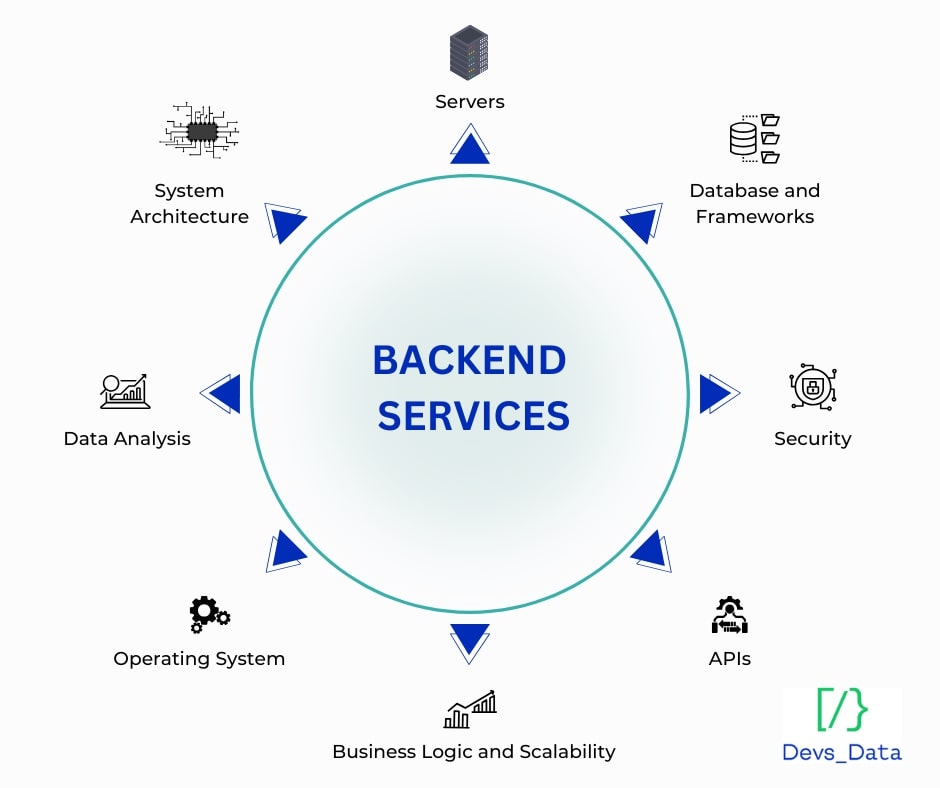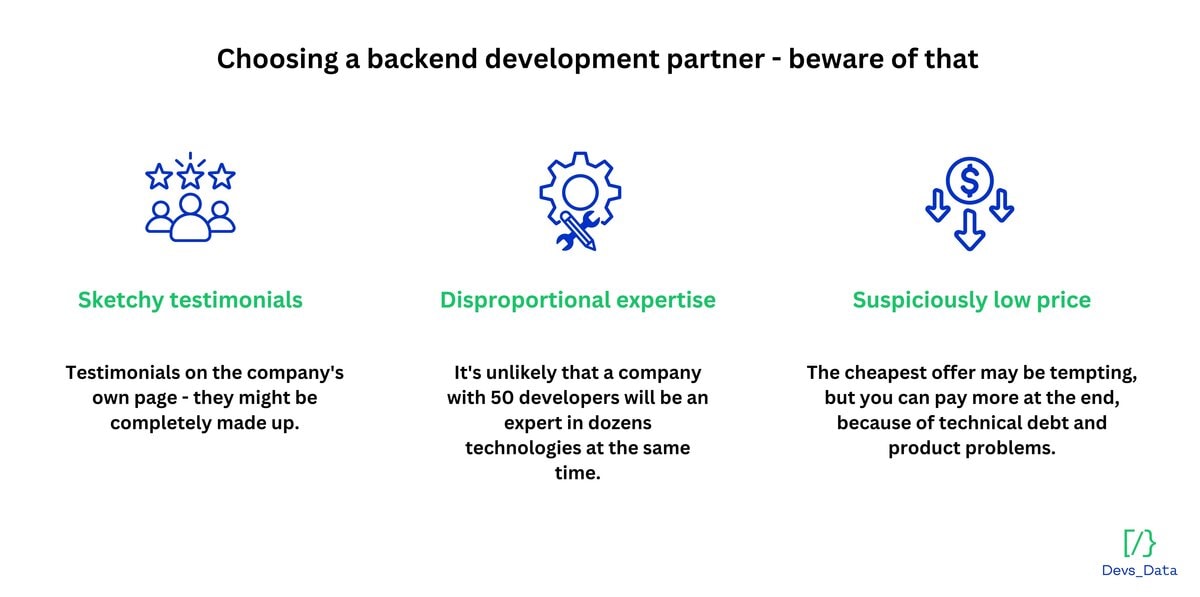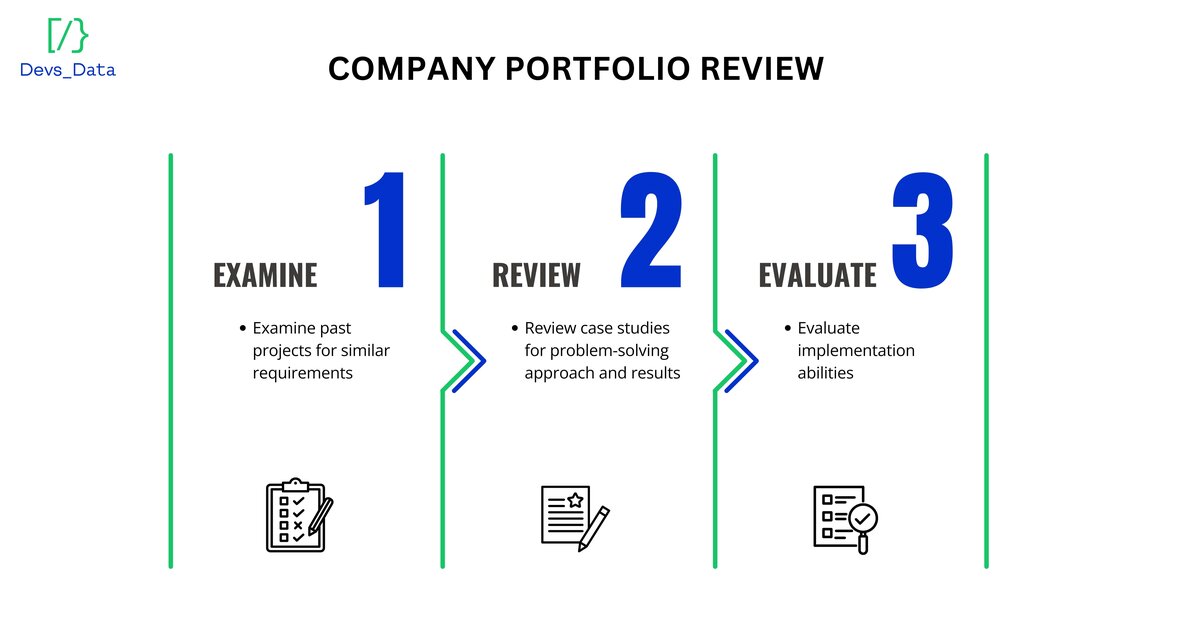


Choosing the right backend development vendor is critical to the success of your digital project. The server side of your application is where the essential things happen: handling data, integrating systems, and ensuring everything runs smoothly. Businesses across various industries, particularly FinTech, eCommerce, and AI, increasingly rely on software development companies to accelerate digital transformation, improve customer experience, and enhance operational productivity.
Recent data indicates that 37% of small businesses globally outsource at least one business process, including software development, to enhance productivity and efficiency. This trend is rising as companies increasingly seek specialized expertise and cost-effective solutions. Notably, 21% of small businesses that outsource now opt for nearshore companies, up from 15% the previous year, reflecting a growing preference for outsourcing partners in closer geographic proximity. Additionally, the global IT outsourcing market is projected to experience significant growth, rising from $541.01 billion in 2024 to $812.71 billion by 2029, according to Statista. This 50.22% increase highlights a steady compound annual growth rate (CAGR) of 8.28%, underscoring the growing reliance on outsourcing to meet evolving business and technology needs.
A poorly chosen vendor can result in performance bottlenecks, security risks, or even the complete failure of a project. A reputable partner, on the other hand, can help you scale effectively, maintain strong security, and ensure seamless platform interoperability. To help you make this vital decision, let’s define backend development, its services, and the essential considerations to keep in mind when choosing a vendor.
Backend development refers to the server-side architecture and logic that powers websites, applications, and software. While the frontend focuses on visuals and user interactions, the backend works behind the scenes to process user requests, manage data, authenticate users, and ensure seamless communication between systems.
Backend developers use programming languages such as Python, Java, Ruby, PHP, and Node.js to build and maintain the infrastructure that keeps digital platforms running smoothly. This includes developing APIs (Application Programming Interfaces), managing databases, handling secure user authentication, and enabling fast, reliable data flow between servers and interfaces.
Effective backend development is critical for:
Backend development is essential for any digital platform’s smooth operation, scalability, and security. Without a strong backend, even the most visually appealing frontend application would fail to function correctly.
Here’s why backend development is critical:
The backend bridges the frontend interface and the database, enabling effective communication and data exchange. It ensures that user requests, such as submitting a form, retrieving account information, or processing transactions, are handled swiftly and accurately, allowing applications to function smoothly and deliver real-time results.
Backend systems are responsible for safeguarding sensitive data by implementing strong security measures. This includes user authentication and authorization protocols, data encryption, and protection against cyber threats such as SQL injections, DDoS attacks, and unauthorized access.
A well-designed backend allows applications to scale effortlessly as business needs evolve. This means handling increasing traffic, managing larger data volumes, and supporting additional features without compromising performance. Scalable backend architectures utilize tools such as load balancers, database sharding, and autoscaling mechanisms to ensure the application remains stable and responsive during periods of peak usage.
Backend developers focus on enhancing server performance by optimizing code, refining database queries, and streamlining server configurations. This reduces response times, minimizes latency, and improves the overall speed and efficiency of the application, contributing to a smoother, more enjoyable user experience.
The backend supports the core business logic of an application, ensuring that essential features and operations function as intended. From processing transactions to managing user permissions and handling notifications, a reliable backend guarantees that the platform remains functional, even under high demand or complex user interactions.

Backend development vendors provide a wide range of specialized services that go beyond basic coding to support the entire server-side ecosystem of your application. These services are tailored to meet different business needs—from building custom APIs to integrating third-party systems and ensuring regulatory compliance.
Below is a breakdown of the core backend services most vendors deliver:
System architecture and infrastructure are the backbone of any scalable and resilient application, ensuring long-term stability and maintainability.
Data and storage management are essential for efficient, reliable, and secure handling of growing volumes of data.
Integration and APIs are crucial for connecting systems, enabling automation, and extending functionality with third-party services.
Security and access control is fundamental for protecting sensitive data, meeting compliance standards, and building user trust.
Performance, scalability, and monitoring are keys to delivering a smooth user experience and preparing systems for future growth.
Content and CMS development is vital for managing and publishing digital content efficiently, especially for marketing and editorial teams.
You’ll need experienced backend developers when building platforms that involve complex data processing, user authentication, or integration with third-party systems. These developers ensure that the application’s architecture supports reliability, scalability, and security from the ground up.
Below is a more detailed look at where backend expertise is crucial and where a more flexible development approach might be sufficient:
A backend specialist ensures everything runs securely and efficiently for stores with complex product structures, multiple currencies, real-time inventory syncing, or integrations with external payment gateways and CRMs.
If you’re building a small online store using platforms like Shopify, WooCommerce, or headless CMS tools, a skilled full stack developer familiar with available plugins and APIs can implement the backend logic without needing a dedicated backend engineer.
Do you have IT recruitment needs?
Real-time chat, activity feeds, media uploads, push notifications, and custom user permissions all require a carefully designed backend architecture. Backend developers build and optimize the necessary services, including real-time data handling using tools like WebSockets or Firebase Cloud Functions.
For early-stage prototypes with minimal user interaction, lightweight tools like Firebase or Supabase can provide backend-like functionality with less setup and overhead.
Custom editorial workflows, role-based access control, versioning, and API-driven publishing systems often require backend development from scratch or heavy customization of existing platforms.
If you’re launching a simple site or blog, solutions like WordPress, Ghost, or Webflow offer built-in backend features that don’t require deep technical involvement beyond setup and theming.
Subscription handling, user management, usage-based billing, audit logging, and scalable architecture demand dedicated backend expertise. They’ll also handle data security and compliance with standards like GDPR or HIPAA.
For MVPs or internal tools, you can often rely on backend frameworks like Django or tools like Retool, Supabase, or low-code platforms to get to market quickly without investing heavily in custom backend development.
Collaborating with an external backend development vendor can be highly effective. To ensure smooth cooperation between the vendor and your internal team, consider the following best practices:
With a proactive approach, your backend vendor can serve as an extension of your in-house team, bringing specialized expertise without compromising cohesion or control.
When planning a software project, choosing the right type of developer is one of the most important decisions you’ll make. Whether you’re building a high-performance backend system or a quick MVP, your choice affects everything from scalability and customization to speed and cost. Here’s a comparative breakdown to help guide your decision:
| Category | Dedicated backend developer | Full stack developer | Low-code developer |
|---|---|---|---|
| Technical expertise | Deep specialization in backend logic, architecture, performance, and security. | Good overall knowledge of both frontend and backend; less depth in backend-specific complexities. | Limited customization; relies on pre-built modules and platform capabilities. |
| Scalability & performance | Designs systems for high-load environments, database sharding, caching, and autoscaling. | Can handle small to medium-scale systems with standard scalability features. | Best for MVPs and internal tools; not ideal for large-scale user bases. |
| Security & compliance | Implements advanced security protocols, data encryption, and compliance (e.g., GDPR, HIPAA). | Covers basic security practices; may not go deep into industry-specific compliance. | Limited to the platform’s built-in security features. |
| Speed to launch | Fast delivery on complex projects due to focused backend knowledge. | Faster for small/medium projects with a balanced frontend-backend structure. | Very fast for basic apps or prototypes; limited flexibility. |
| Customization | High—can build complex APIs, integrations, and custom logic tailored to your business. | Moderate—can build custom features but may hit limits with complex backend requirements. | Low customization depends on the platform’s boundaries. |
| Best use cases | SaaS platforms, eCommerce systems, enterprise software, and real-time data processing. | Web apps, mobile apps, startups, and dashboards with moderate backend complexity. | MVPs, internal admin panels, and basic apps. |
| Maintenance & long-term support | Ongoing support, monitoring, scaling, and proactive issue resolution. | Can provide support but may lack depth in backend lifecycle management. | Limited to what the low-code tool allows; may require switching platforms for growth. |
| Cost efficiency | Cost-effective for long-term, complex projects that require deep backend expertise. | Cost-effective for general-purpose apps or smaller dev teams. | Low cost upfront, but can become limiting or more expensive as scaling and customization become necessary. |
Each developer type has its strengths depending on the nature of your project. If you’re building something complex and performance-driven, a dedicated backend developer is often worth the investment. On the other hand, full stack and low-code developers can offer speed and cost savings for more general or internal projects. Align your choice with your project’s long-term goals to avoid limitations down the road.
Choosing the right backend development vendor is a crucial decision that directly impacts the success of your project. It requires a clear understanding of your technical needs, business goals, and available budget, alongside a careful assessment of potential partners. Conducting due diligence ensures the vendor’s capabilities, processes, and communication style align with your expectations. A strategic, well-informed selection process reduces risk, enhances collaboration, and lays the groundwork for a successful, long-term partnership.
As part of this evaluation, it is essential to look beyond surface-level marketing. The image above outlines three common red flags to be aware of: unverifiable testimonials, which may be fabricated; overstated expertise, where small teams claim mastery in an unrealistic number of technologies; and suspiciously low pricing, which often leads to hidden costs from technical debt or product instability. Recognizing these signs early helps you choose a vendor you can rely on.

Before contacting vendors, clearly outline your project’s scope, goals, and technical requirements. This includes specifying the type of application you’re building (e.g., eCommerce platform, SaaS product, internal tool), identifying required integrations (such as payment gateways, CRMs, or third-party APIs), and defining performance or scalability expectations.
To structure this effectively, prepare a brief or technical specification document that covers:
Having a clear plan in place helps you filter for vendors with the right expertise and ensures that both technical and business priorities are fully addressed from the start.
Make sure the vendor has experience with relevant backend technologies and frameworks. This includes:
Do you have IT recruitment needs?
Check the vendor’s previous work, especially projects similar to yours. Analyzing case studies enables you to understand how the vendor has addressed challenges, met deadlines, and achieved results. A strong portfolio showcases technical expertise and provides insights into the vendor’s ability to align solutions with specific business goals.

Effective communication is crucial for project success, but evaluating it before entering a partnership is equally important. Here’s how to do that:
A vendor should:
Your vendor should adhere to best security practices to protect sensitive data and maintain compliance with regulations. Look for:
Look for client feedback, case studies, or third-party reviews to assess the vendor’s reliability and performance. Positive testimonials from businesses with similar requirements can provide valuable insights. Also, consider checking independent review platforms or professional networks like Clutch, GoodFirms, or LinkedIn.
While cost shouldn’t be the sole deciding factor, aligning a vendor’s pricing with your budget is essential for a successful and sustainable partnership. Begin by requesting a detailed pricing breakdown covering core development work, infrastructure, ongoing maintenance, and third-party services. Ensure that you clarify what is included in the base offer and what may incur additional fees, such as testing, post-launch support, or implementation of new features.
Transparency early on is key. Be upfront about your financial parameters to avoid misalignment later in the process. It’s also essential to understand the vendor’s pricing structure, whether they charge by the hour, by milestone, or offer fixed-price packages, and confirm whether they can accommodate flexible payment terms that fit your cash flow or funding cycle.
To evaluate proposals effectively, consider industry benchmarks as a reference point. Backend development rates typically range from $30 to $70 per hour in Eastern Europe and Latin America and from $80 to $150 per hour in North America and Western Europe. For dedicated developers, monthly costs typically range from $8600 to $15000, depending on their experience level and location.
Finally, be aware of hidden costs. A lower upfront quote may not include essential services like maintenance or bug fixes, leading to unexpected expenses later. A clear, transparent discussion about cost structure helps avoid surprises and sets the foundation for a smoother collaboration.
A good backend development vendor should offer post-launch support to ensure the ongoing success of your project. Look for:
To bring structure and clarity to your evaluation process, consider using a vendor capability matrix or supplier capability matrix. These tools help you assess potential partners based on a set of predefined criteria, turning subjective impressions into measurable insights.
Both tools help you:
By combining technical due diligence with structured evaluation frameworks like these, you’ll gain a clearer picture of which vendor is truly capable of supporting your backend development goals, not just at launch, but long-term.
| Criteria | Weight | Vendor A | Vendor B |
|---|---|---|---|
| Technical expertise | 25% | 9 | 7 |
| Communication & responsiveness | 15% | 8 | 9 |
| Post-launch support | 10% | 8 | 7 |
| Pricing transparency | 10% | 7 | 8 |
| Security & compliance | 15% | 9 | 8 |
| Scalability & flexibility | 15% | 8 | 7 |
| Relevant portfolio | 10% | 9 | 8 |
| Weighted score | 100% | 8.3 | 7.8 |
| Criteria | Weight | Vendor A | Vendor B |
|---|---|---|---|
| Financial stability | 20% | High | Medium |
| Capacity to scale | 20% | Excellent | Good |
| Compliance & risk management | 15% | Compliant | Partial |
| Innovation potential | 15% | Strong | Moderate |
| Relationship fit (culture, values) | 10% | Strong | Moderate |
| Cost efficiency | 20% | Fair | Good |
| Strategic fit score | 100% | High | Medium |
These tables offer a structured, side-by-side comparison to support more objective and transparent decision-making. The Vendor Matrix is typically used for evaluating software or backend development partners. At the same time, the Supplier Matrix is better suited for broader strategic evaluations, such as long-term service providers or procurement partnerships.
Do you have IT recruitment needs?
Please note:
The numbers and ratings in the example matrices are provided for illustrative purposes only. Every project is unique, so your scoring system and weight distribution should reflect your actual priorities. You may want to involve key stakeholders from technical, financial, and operational teams when building your custom matrix to ensure a well-rounded assessment.
By customizing these matrices, you’ll gain a clear, data-backed perspective, minimizing guesswork and helping you choose the partner that best fits your requirements.
Website: www.devsdata.com
Team size: ~60 employees
Founded in: 2016
Headquarters: Brooklyn, NY, and Warsaw, Poland
When it comes to finding a reliable, high-performing backend development partner, DevsData LLC sets the standard. Known for its technical excellence and tailored solutions, DevsData LLC offers businesses across industries dependable, cost-effective software development services designed to meet specific needs and drive measurable results.
With a highly skilled team of certified professionals, DevsData LLC brings years of hands-on experience across diverse software development methodologies. Their core services go beyond simple development—they cover the entire product lifecycle, including:
By partnering with DevsData LLC, businesses gain access to a team that offers time zone alignment, cultural compatibility, and strict adherence to data security and privacy regulations, essential for projects requiring precision, speed, and security.
DevsData LLC collaborates with cutting-edge startups and fast-growing companies across the US, Israel, and beyond. Their flexible, client-centric approach offers competitive pricing while maintaining premium-quality results.
With over 100 successful projects completed across various sectors—including FinTech, eCommerce, and AI—the company has earned top-tier ratings on platforms like Clutch and GoodFirms. Their extensive experience and dedication to client success consistently deliver results that exceed expectations.
One of DevsData LLC’s standout projects involved collaborating with a Silicon Valley FinTech leader to develop groundbreaking payment processing technology. The backend team was pivotal in building a solid, scalable infrastructure that enabled secure, real-time, cross-border transactions between Latin America and the United States. Their backend experts optimized data flow, built high-performance APIs, and ensured compliance with regional financial regulations, reducing processing times and transaction costs. This project underscores DevsData LLC’s ability to deliver reliable and high-impact solutions for clients worldwide. You can explore more details about this achievement in the case studies section on their website.
With development teams boasting an average of 10+ years of specialized experience, DevsData LLC consistently sets industry benchmarks in backend development. Their extensive portfolio showcases innovative solutions and success stories, highlighting their technical prowess and client-focused approach.
Beyond software development, DevsData LLC also offers comprehensive Employer of Record (EoR) solutions, including:
Whether you’re an innovative startup or an established enterprise, DevsData LLC offers a unique combination of technical expertise, customized solutions, and global reach. Their commitment to excellence, security, and client satisfaction makes them a trusted backend development partner for businesses looking to scale effectively and securely.
For more information, reach out at general@devsdata.com or visit www.devsdata.com.
Backend development services are the foundation of any successful digital platform. They ensure that your application is not just visually appealing but also functional, scalable, and secure. A strong backend powers essential operations—managing data, executing business logic, and enabling smooth communication between systems. Without a well-structured backend, even the most innovative digital products risk performance issues, security breaches, and operational inefficiencies that can hinder growth and damage user trust.
Selecting the right backend development vendor is an investment in your project’s future. By clearly defining your needs, thoroughly assessing technical expertise, and considering long-term support, you can ensure that your backend infrastructure is robust, scalable, and secure. Don’t rush this decision—take your time to research, ask the right questions, and choose a partner who understands your vision and can help you bring it to life successfully.
This is where DevsData LLC stands out as the ideal partner. Their proven track record, global expertise, and deep technical knowledge make them a top choice for businesses looking for reliable backend development solutions. With a flexible, client-first approach, DevsData LLC crafts scalable, secure, and high-performing infrastructures tailored to your business goals. Whether scaling an existing platform or developing a groundbreaking new solution, partnering with DevsData LLC ensures that your project is built on a solid, future-proof foundation.
Frequently asked questions (FAQ)
DevsData – your premium technology partner
DevsData is a boutique tech recruitment and software agency. Develop your software project with veteran engineers or scale up an in-house tech team of developers with relevant industry experience.
Free consultation with a software expert
🎧 Schedule a meeting
FEATURED IN


DevsData LLC is truly exceptional – their backend developers are some of the best I’ve ever worked with.”
Nicholas Johnson
Mentor at YC, serial entrepreneur


 Build your project with our veteran developers
Build your project with our veteran developers
 Explore the benefits of technology recruitment and tailor-made software
Explore the benefits of technology recruitment and tailor-made software
 Learn how to source skilled and experienced software developers
Learn how to source skilled and experienced software developers




Categories: Big data, data analytics | Software and technology | IT recruitment blog | IT in Poland | Content hub (blog)
